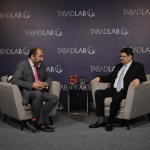You can download the e-reader friendly version here.
The Path to Universal Health Coverage
Covid-19 has wreaked havoc on public health all around the world. It has not only presented new challenges, but also amplified old ones for public health systems. Tabadlab brought together a panel of diverse global experts to discuss how countries can offer universal health coverage in an age where pandemics like Covid- 19 are a clearly present and enduring reality. This discussion took place in the context of Tabadlab’s new working paper on ‘Shaping 21st Century Public Health in Pakistan’.
Featured Panelists

Dr. Muhammad Ali Chaudhry is is an entrepreneurial healthcare executive and the Founder and CEO of Emerging Health International

Dr. Dilshaad bin Abas Ali is the CEO of Makkah Healthcare and has also had the experience of serving in the Ministry of Health in Saudi Arabia

Dr. Sara Saeed Khurram is the CEO of Sehat Kahani and the co-founder of DoctHERs, an award winning health-tech startup

Zeina Khouri-Stevens is the Chief Clinical Executive at Clemenceau Medical Center in Dubai

Steven J. Thompson is the Principal at NorthStar Healthcare Advisors, an advisory and consulting firm
Discussion Summary
Preparedness
Using the UAE and Saudi Arabia as an example, the panelists unpacked the prompt health response, which was required, due to the onset of Covid-19. This included quick planning, capacity building through the mobilization of staff and infrastructure, and evaluating mass gatherings like the Hajj in advance to ensure the safety of populations.
Public and Private Sector Partnership
When the public health sector does not have the capacity to handle the implications of a pandemic, it is pertinent to streamline the aid of private hospitals and pull together resources to make healthcare widely accessible. The notion of boundary between private and public has changed over time. Private sector efficiencies need to be leveraged for improved healthcare delivery.
Changing Disease Demographics
Is the current health coverage cognizant of changing disease profiles? Using the findings of the working paper, the panellists discussed how worldwide disease demographics are shifting to predominantly non- communicable diseases that require a preventative approach more than the existing focus on curative care.
Healthcare Delivery
It is important to distinguish between public health and public health service delivery, and to ensure that the implementation of healthcare policies is given just as much attention to uplift both of them.
Communication
There has been a communication problem between the centre and provinces in Pakistan. The government needs to become smart about deploying its resources to tackle some of the systemic inefficiencies due to devolution in healthcare.
Workforce Development
There is a need for more skilled workers at every level–from nurses and technical staff to physicians, and across both public and private sectors. There is a need to train and certify more nurses and provide them with the skills and training. Moreover, the licensing of nurses needs to be standardized to ensure that they are capable of delivering the best of their ability.
Digital Transformation
The Covid-19 pandemic has paved an opportunity to accelerate digital transformation in the public health sector. The government can leverage digital tools to virtually train lady healthcare workers, collect data, and educate the public on basic health hygiene.
Key Resources
A Resident Fellow and Head of Growth at Tabadlab.





